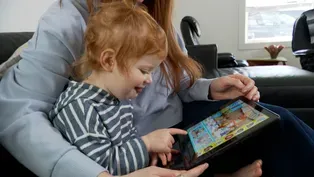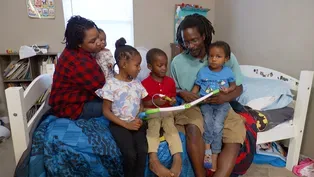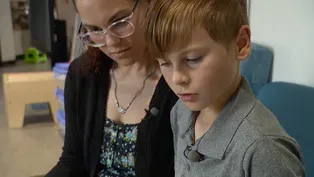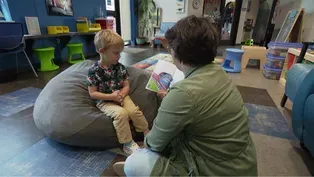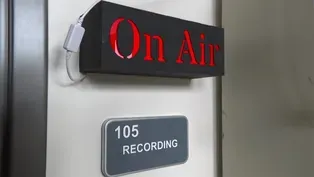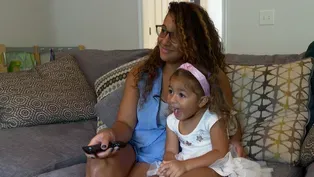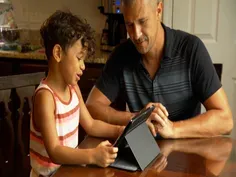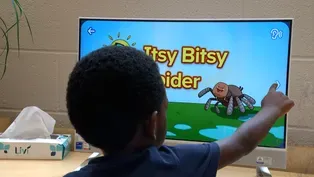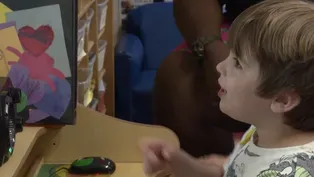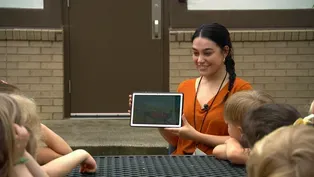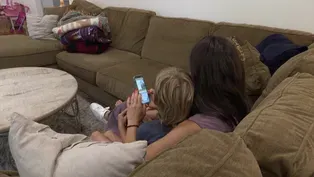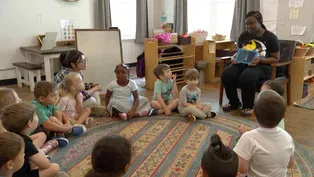
Introducing Media to Kids
8/21/2023 | 1m 4sVideo has Closed Captions
Setting a healthy example and limiting screen time can help introduce kids to media.
As computers, tablets and phones become increasingly integral to our lives at all ages, it's important to be thoughtful about introducing young children to media. Tips for parents include limiting TV time and watching alongside children to add context. Setting media-free spaces, encouraging screen-free activities, and avoiding making screen time a reward for good behavior are also good practices.
Problems with Closed Captions? Closed Captioning Feedback
Problems with Closed Captions? Closed Captioning Feedback
Learning to Read is a local public television program presented by WNPT
Funding for LEARNING TO READ is provided by the Dollar General Literacy Foundation and the Hays Foundation.

Introducing Media to Kids
8/21/2023 | 1m 4sVideo has Closed Captions
As computers, tablets and phones become increasingly integral to our lives at all ages, it's important to be thoughtful about introducing young children to media. Tips for parents include limiting TV time and watching alongside children to add context. Setting media-free spaces, encouraging screen-free activities, and avoiding making screen time a reward for good behavior are also good practices.
Problems with Closed Captions? Closed Captioning Feedback
How to Watch Learning to Read
Learning to Read is available to stream on pbs.org and the free PBS App, available on iPhone, Apple TV, Android TV, Android smartphones, Amazon Fire TV, Amazon Fire Tablet, Roku, Samsung Smart TV, and Vizio.
Providing Support for PBS.org
Learn Moreabout PBS online sponsorshipMore from This Collection
Creating a Family Media Use Plan
Video has Closed Captions
Working on a usage plan together can help families use media in a more balanced way. (1m 4s)
Video has Closed Captions
A “Wonderbook” is a tool parents can use to build literacy skills. (1m 4s)
Video has Closed Captions
Using a 3D printer is one way young readers can enhance their digital and media literacy. (1m 4s)
Voice Recordings to Improve Reading
Video has Closed Captions
Hearing their recorded voices can help young readers improve their literacy skills. (1m 4s)
Making Screen Time Learning Time
Video has Closed Captions
A family shares how they turn TV time into a productive learning opportunity. (1m 4s)
Video has Closed Captions
Having screen-free zones can help families balance the pros and cons of media for kids. (1m 4s)
Using Technology to Enhance Reading
Video has Closed Captions
Parents and educators can nurture reading skills in exciting ways using technology. (1m 4s)
Video has Closed Captions
Digital resources can help your child develop important numeracy and literacy skills. (1m 4s)
Video has Closed Captions
Using print and digital books to promote early literacy learning. (1m 4s)
Video has Closed Captions
Instead of merely consuming media, creating it can be a great way to build kids' skills. (1m 4s)
Video has Closed Captions
Digital field trips are a great option to promote learning using media in a fun way. (1m 4s)
Providing Support for PBS.org
Learn Moreabout PBS online sponsorship(upbeat music) - My children are in kindergarten and third grade and we monitor how much screen time they are exposed to.
Even though my kids are still young, they have friends who have phones and tablets already.
Screen time has just gotten much too long for all of us.
We limit TV time and try to watch alongside our kids when we can, so we can give context to what they're seeing.
We also try to lead by example and set media-free spaces.
We don't text at the table, no technology at bedtime.
We look at people when we are talking to them and not at our phone.
We encourage other activities that don't involve screens, like actually reading a book or doing something physical.
We are trying to not make screens the reward or the consequence so they don't overvalue media.
We try to model that we have a wide range of interests that are just as rewarding as screen time.
- Oh, swivel chair.
- You know that one, don't You?
- [Narrator] Made possible by the generous support of the Marlene and Spencer Hayes Foundation.
(upbeat music)
Learning to Read is a local public television program presented by WNPT
Funding for LEARNING TO READ is provided by the Dollar General Literacy Foundation and the Hays Foundation.
